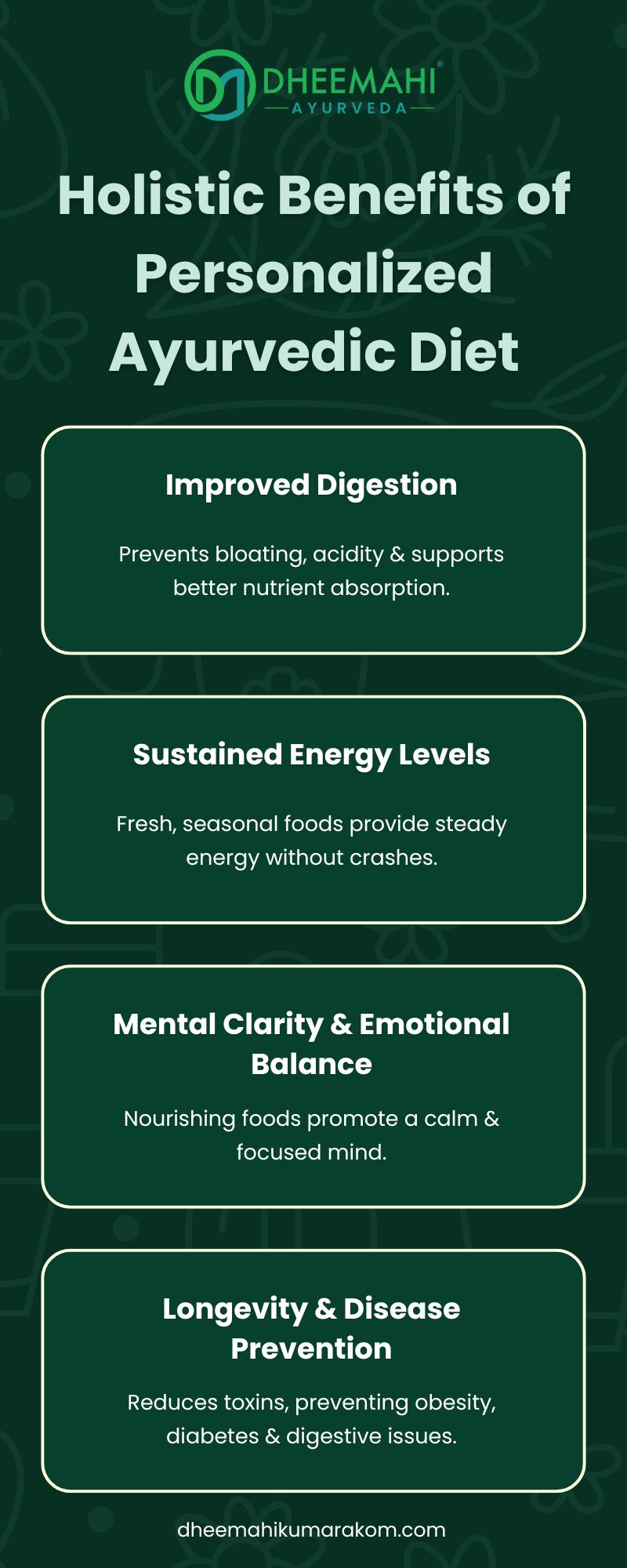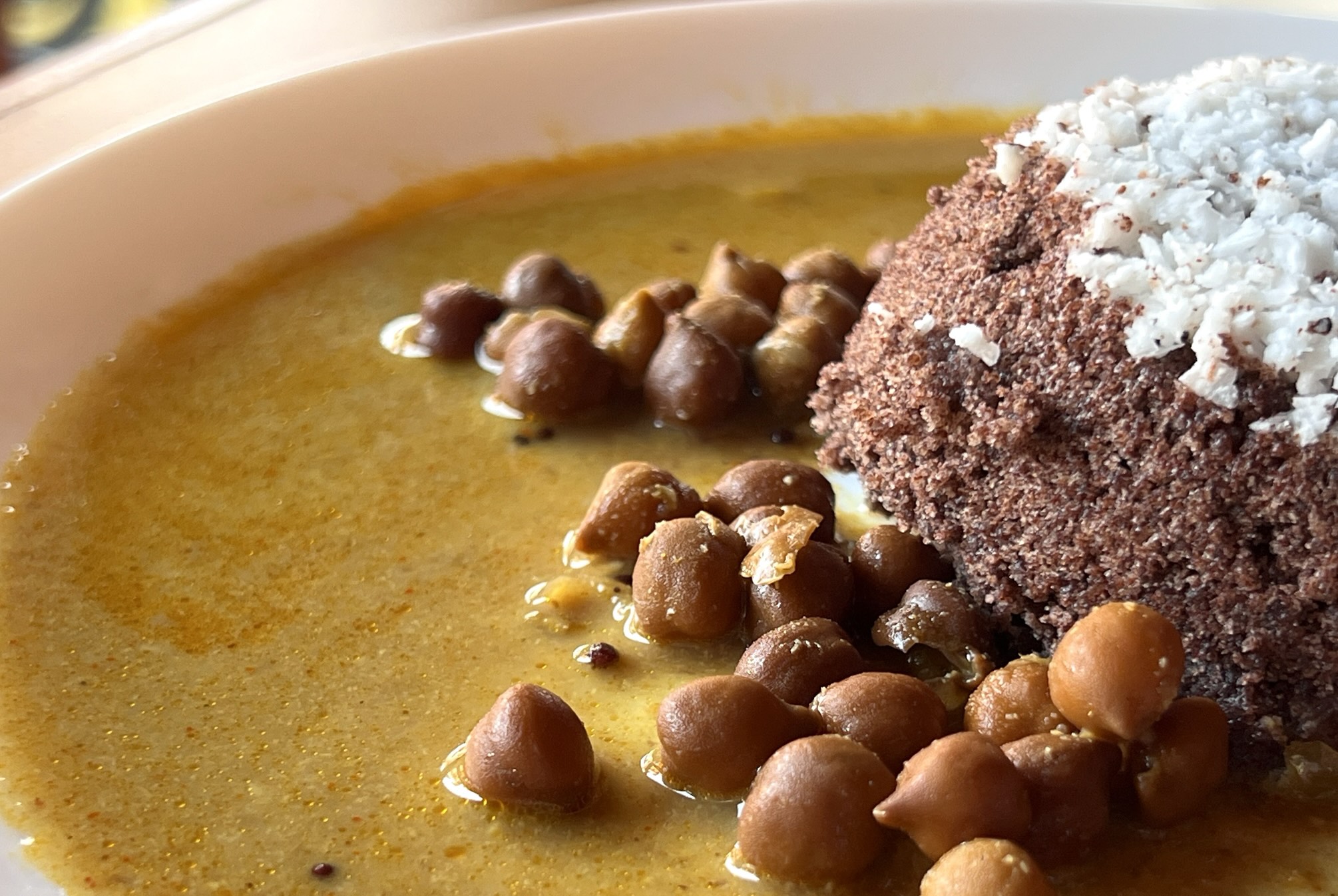The Importance of Personalized Diet Plans in Ayurvedic Weight Loss Retreats
Dr. Shefeena P
Ayurveda, the ancient system of holistic healing, emphasizes the role of personalized nutrition in achieving sustainable weight loss. Unlike one-size-fits-all diets, Ayurveda recognizes that each individual has a unique constitution (Prakriti) and metabolic tendencies that influence their weight and overall health. Ayurvedic weight loss retreats provide a structured environment where individuals receive customized diet plans based on their Dosha (biological energies). These personalized meal plans ensure that the body receives the right nourishment, supports digestive fire (Agni), and promotes natural detoxification. By following Ayurvedic dietary principles, individuals can achieve weight balance while improving their overall well-being.
Why Ayurveda Focuses on Personalized Diet Plans for Weight Loss
The Concept of Ahara (Diet) in Ayurveda
Ahara, or diet, is one of the three key pillars of health in Ayurveda, along with Nidra (sleep) and Brahmacharya (balanced lifestyle). According to Ayurvedic principles, food is not just a source of sustenance but also a form of medicine. The right diet supports digestion, enhances metabolic function, and prevents the accumulation of toxins (Ama) that contribute to weight gain. Ayurveda views food as an essential component in maintaining harmony between the mind and body.
Dietary Needs for Different Doshas
In Ayurveda, the three Doshas—Vata, Pitta, and Kapha—govern physiological functions, and each Dosha requires a specific dietary approach to maintain balance:
Vata Dosha: Characterized by dryness, lightness, and irregularity, individuals with a Vata imbalance benefit from warm, moist, and grounding foods. Nourishing soups, cooked grains, and healthy fats like ghee help stabilize Vata and prevent erratic metabolism.
Pitta Dosha: Dominated by heat and intensity, Pitta individuals require cooling, hydrating, and mildly spiced foods. Fresh fruits, leafy greens, and coconut-based dishes help regulate their metabolism without causing inflammation.
Kapha Dosha: Kapha’s qualities of heaviness and sluggishness necessitate light, warming, and stimulating foods. Spices like ginger, black pepper, and bitter greens aid in boosting metabolism and reducing fat accumulation.
The Role of Agni (Digestive Fire) in Weight Management:
Ayurveda emphasizes Agni, or digestive fire, as a critical factor in achieving and maintaining healthy body weight. A strong Agni ensures efficient digestion, absorption, and metabolism of nutrients. When Agni is weak, undigested food turns into toxins (Ama), leading to weight gain and metabolic disorders. Personalized diet plans focus on rekindling Agni through appropriate food choices, meal timings, and herbal support.
How Ayurvedic Retreats Customize Diet Plans for Effective Weight Loss
Initial Dosha Assessment
One of the first steps in an Ayurvedic weight loss retreat is the assessment of an individual’s Dosha constitution. Practitioners conduct detailed evaluations, including pulse diagnosis (Nadi Pariksha), tongue analysis, and lifestyle assessment, to determine imbalances. Based on this assessment, a personalized dietary regimen is designed to restore harmony and promote weight loss.
Use of Seasonal and Local Ingredients
Ayurveda places significant importance on consuming seasonal and locally sourced foods. These ingredients are naturally attuned to the body’s needs, making them more digestible and nourishing. Fresh vegetables, whole grains, and Ayurvedic superfoods like Moringa and Amla play a vital role in enhancing metabolism and eliminating toxins.
Meal Timing and Eating Habits
Ayurvedic retreats emphasize mindful eating practices, including:
- Avoiding late-night heavy meals to prevent toxin accumulation.
- Chewing food thoroughly to aid digestion and assimilation.
- Consuming meals in a peaceful and distraction-free environment to enhance awareness and satiety.
Ayurvedic Foods and Herbs Included in Weight Loss Diet Plans
Herbs That Aid Digestion and Fat Loss
Ayurvedic weight loss diets incorporate powerful herbs known for their metabolic-boosting and detoxifying properties:
- Triphala: A blend of three fruits (Amalaki, Bibhitaki, Haritaki) that supports digestion and detoxification.
- Guggulu: Helps break down fat tissues and enhance lipid metabolism.
- Turmeric: Known for its anti-inflammatory and fat-burning properties, turmeric improves liver function and digestion.
Light and Easily Digestible Foods
To enhance metabolism and prevent sluggish digestion, Ayurvedic retreats emphasize light, sattvic (pure) foods, including:
- Steamed vegetables with Ayurvedic herbs
- Herbal teas infused with cumin, fennel, and coriander .
These foods nourish the body while reducing digestive strain, allowing for efficient metabolism and fat loss.
Detoxifying Herbal Teas and Healing Drinks
Ayurvedic retreats often provide herbal teas and decoctions to promote digestion and fat metabolism. Common preparations include:
- Ginger and lemon tea to boost metabolism
- Cumin-coriander-fennel tea to reduce bloating
- Aloe vera juice for internal cleansing
The Long-Term Benefits of Following a Personalized Ayurvedic Diet
Sustaining Weight Loss with an Ayurvedic Diet
One of the biggest concerns after completing an Ayurvedic retreat is preventing weight rebound. Many individuals struggle with keeping the weight off once they return to their regular lifestyle. Ayurveda offers a sustainable solution through a personalized diet tailored to your unique dosha—Vata, Pitta, or Kapha.
A structured Ayurvedic diet helps in:
- Balancing Agni (Digestive Fire): Proper digestion is key to maintaining an optimal weight. Personalized Ayurvedic diets focus on enhancing Agni, ensuring that food is properly metabolized and absorbed rather than accumulating as toxins or excess fat.
- Avoiding Ama (Toxins): Post-retreat, a disciplined diet prevents the buildup of Ama, which can lead to sluggish metabolism and weight gain.
- Ensuring Satiety: Ayurvedic diets emphasize wholesome, nutrient-dense foods that naturally curb cravings and unnecessary snacking, thus preventing overeating
By following these principles, you can avoid common pitfalls such as binge eating, erratic meal timings, and processed food consumption, all of which contribute to weight gain.
Discipline in dietary habits is crucial for maintaining weight loss and preventing imbalances. Ayurveda advocates mindful eating practices that help sustain the benefits of a retreat. Here’s how discipline plays a role:
- Eating According to Your Dosha: Understanding what foods suit your constitution ensures that your metabolism functions efficiently. For example, a Kapha-pacifying diet focuses on light, warm foods to prevent weight gain, while a Vata diet includes grounding, nourishing meals.
- Following a Routine: Ayurveda emphasizes regular meal times to align with the body’s natural rhythms. Eating at consistent times prevents erratic digestion and unnecessary weight fluctuations.
- Chewing and Eating Mindfully: Slow, mindful eating enhances digestion, allowing the body to extract maximum nutrients from food while preventing overeating.
- Seasonal Adjustments: Ayurveda encourages modifying your diet based on seasonal changes to maintain balance and prevent unnecessary weight accumulation.
Holistic Benefits of a Personalized Ayurvedic Diet
Beyond weight management, an Ayurvedic diet contributes to overall well-being, digestion, and energy levels. Here’s how:
- Improved Digestion: A diet tailored to your dosha helps prevent bloating, acidity, and sluggish digestion, leading to better nutrient absorption.
- Sustained Energy Levels: Eating fresh, seasonal, and Sattvic foods keeps the body energized throughout the day without sudden crashes.
- Mental Clarity and Emotional Balance: Food influences the mind, and an Ayurvedic diet rich in fresh, nourishing ingredients fosters a calm and focused state of being.
- Longevity and Disease Prevention: By maintaining balance and reducing toxin accumulation, Ayurveda helps prevent lifestyle disorders such as obesity, diabetes, and digestive issues.

Conclusion
Ayurvedic weight loss retreats provide a holistic approach to achieving and maintaining a healthy weight by emphasizing personalized diet plans. By understanding the unique dietary needs of each Dosha, individuals can adopt sustainable eating habits that support digestion, metabolism, and overall well-being. The combination of mindful eating, seasonal foods, and Ayurvedic herbs ensures long-term health benefits beyond weight loss. By following these principles, individuals not only shed excess weight but also cultivate a deeper connection with their body’s nutritional needs, paving the way for lifelong wellness.
How Our Booking Process Works
The unique approach involves a series of discussion during your initial decision-making process to make sure that we will be able to match your expectations with our treatment.
Based on the discussions with you our team of expert doctors will design the best treatment package personalized for your needs.
01
Consultation Form
Fill out our consultation form, and let us know when will you be available for our doctor to talk to you
02
Discussion with Doctor
Discuss your health condition and expectations with our doctor.
03
Booking Confirmation
Confirm the booking by making a payment of 50% advance.
Consultation Form
Submit this form to initiate a booking with us
Have any queries? We will help you. Talk to us now
Say Goodbye to Health Woes & Hello to Healthy Living
Dheemahi Ayurvedic Pvt Ltd
12/386 Varaputhara Road
Kumarakom, Kerala, India
Pin 686563
Dheemahi Ayurvedic Centre, Near Neelimangalam Bridge, Kumaranaloor, Perumbaikad.P.O, Kottayam, Kerala, India, Pin 686016
Other Treatments
Karkidaka Chikilsa | Ayurvedic Treatment for Depression | How to Reduce Stress Naturally | Autoimmune Disorders | Mental Health Ayurvedic Treatment | Weight-Loss Treatment | Frozen Shoulder Ayurvedic Treatment | Diabetes Ayurvedic Treatment | PCOS Ayurvedic Treatment | Celiac Disease Treatment | ayurvedic treatment for skin diseases | nervous system ayurvedic treatment | Back Pain Ayurvedic Treatment | Cervical Spondylitis Ayurvedic Treatment | ayurvedic treatment for blood sugar | Fatty Liver Ayurvedic Treatment | Knee Pain Ayurvedic Treatment | Migraine Ayurvedic Treatment | Osteoarthritis Ayurvedic Treatment | Psoriasis Ayurvedic Treatment | Sinusitis Ayurvedic Treatment | Ayurvedic Detox Treatment | Migraine Ayurvedic Treatment | Ayurvedic Treatment for Rheumatoid Arthritis | Ayurvedic treatment for joint pain | Ayurvedic treatment for ulcerative colitis | Panchakarma Treatment |

